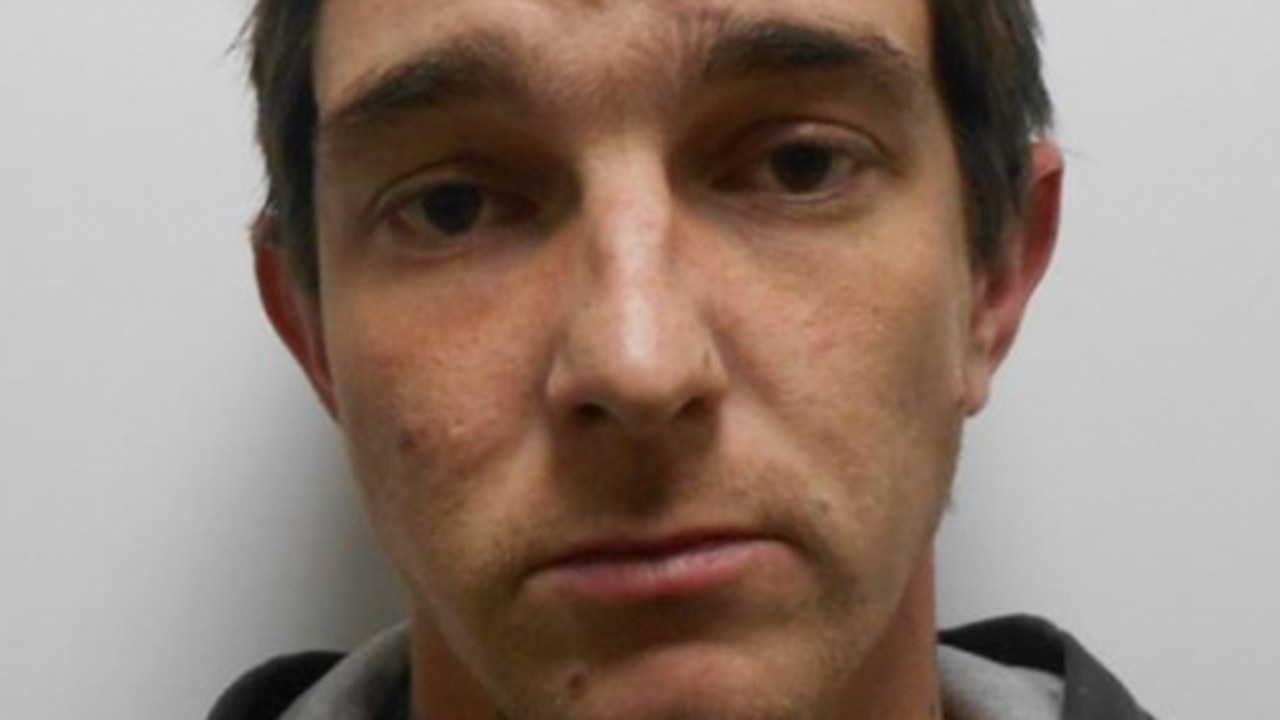Hostage dialled triple-0 during Yacqub Khayre’s ISIS-motivated siege at Brighton, inquest reveals
An inquest has revealed the brave actions of a sex worker who thought she was going to a routine job, but was instead held hostage in a terrifying ISIS-motivated siege.
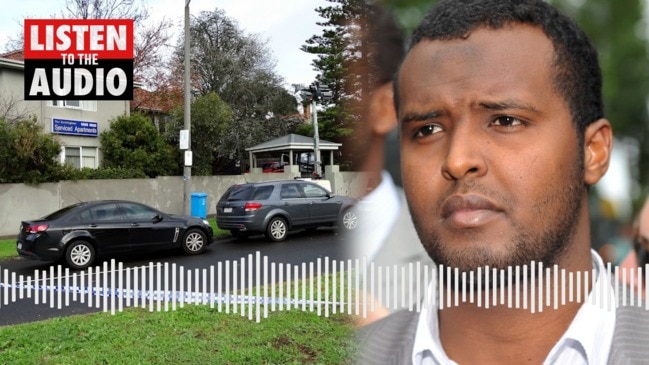
NewsWire
Don't miss out on the headlines from NewsWire. Followed categories will be added to My News.
When a sex worker went to the Buckingham International Serviced Apartments in Brighton to meet a client on the afternoon of June 5, 2017, it was supposed to be for a routine job.
Instead she was taken hostage by a man who claimed to have a bomb.
Her hands were bound in cable ties and her mouth was covered with tape.
The terrified woman watched her tormentor pray on a rug on the floor of apartment 11 before he briefly left.
She heard gunshots from outside the room.
The man had just murdered Kai Hao, the receptionist for the apartments.
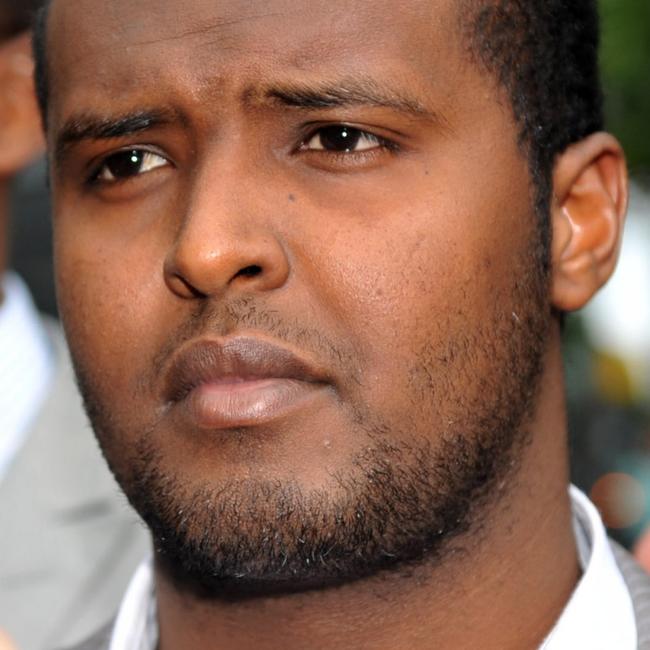
Despite the terrifying circumstances, the escort — who cannot be named by court order — did not meekly accept her fate.
In the few minutes she was left alone she struggled to partially free her hands from the cable ties.
She was able to reach her phone, which had been knocked out of her bra onto the ground.
Horrifying audio of two triple-0 calls she made record the gunman returning and encouraging the operator to send police, even helping to give them the right address.
He then called Channel 7 to tell them his actions were for ISIS and al-Qaeda.
Within two hours he would be dead, killed in a gunfight with police that also injured three officers.
The escort was left traumatised but alive.
The events before, during, and after the day of the siege committed by 29-year-old Yacqub Khayre are the subject of an inquest before the Coroners Court of Victoria, which concluded on Friday.
Coroner Audrey Jamieson will determine what actions, if any, could have prevented the horror day.
‘PERFECT’ HUSBAND SLAIN TWO MONTHS AFTER WEDDING
Kai Hao, who also went by Nick, had been married for less than two months when his life was taken from him by a complete stranger.
The killing left Mr Hao’s widow Lu Li devastated and alone in Melbourne after moving from Shanghai to be with her husband.
“We would have spent the rest of our lives together,” she said in a statement made in the weeks following the attack.
“We talked about many things — including our future, how many children we would have, how we were going to live our life, what we were going to do in our retirement.
“We were very happy.”
Mr Hao was murdered in the senseless attack about 4pm on June 5.
For more than seven hours, his wife had no idea what had happened.
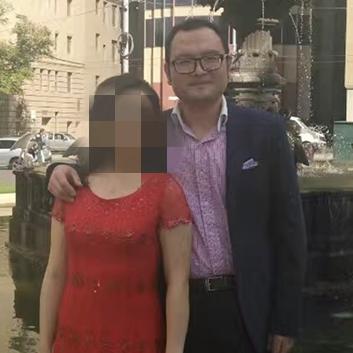
After he didn’t come home from work at the usual time of 7.30pm she sent him a message, but assumed he had gone out with friends.
At 11pm there was a knock on the door.
“His friend asked me to come out for a talk,” she said.
“He dared not tell (Mr Hao’s) parents for fear they might not withstand the shock.
“He only said there was an incident at the hotel where a terrorist was involved.”
When she finally learned the truth, she felt pain worse than she imagined was possible.
“In the first couple of days after this incident, everyone was in great misery in our family,” she said.
“None of us felt hungry or sleepy. We just sat there dumbfounded and kept crying.”
She woke up every morning in “heart-wrenching sadness”, too hurt to say his name.
“Only 36 years … he only lived for 36 years,” she said.
“I don’t think I can possibly find someone who would suit me better, someone who could get along with me so perfectly.”
Mr Hao’s grieving family believe he would still be alive if the killer had not been released on parole.
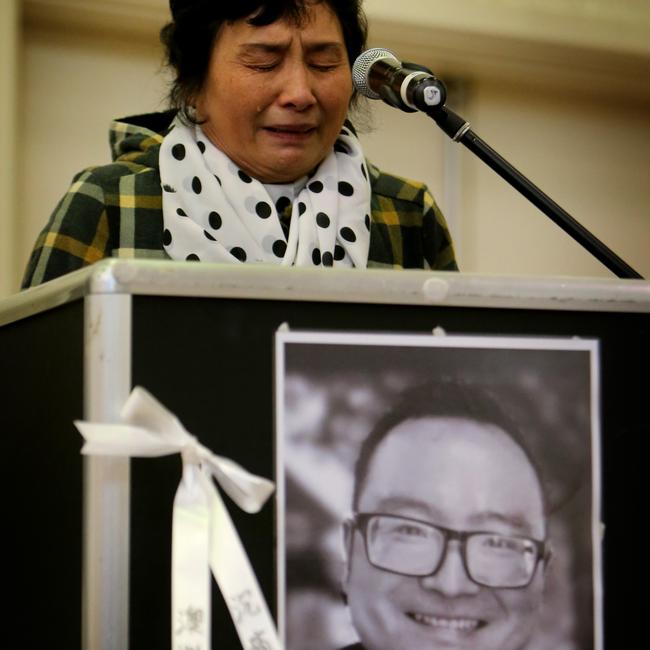
Khayre served four years and two months of a five-and-a-half-year sentence for offences including aggravated burglary.
He was granted parole about six months before the deadly siege.
The family’s representative, Shine Lawyers legal practice manager Cameron Tout, said Mr Hao’s killer should have been better supervised by the corrections system.
“Kai Hao’s family returned to China after his death in the hope of moving on with their lives,” he said.
“We maintain the gunman should never have been released on parole given his extensive criminal history, evaluation of being a high risk of reoffending on release and prior terrorism-related charges.
“There were deficiencies in the recommendations made in support of his release from prison and as a result the supervision orders were wholly inadequate.
“If proper procedures had been followed, Kai Hao could still be alive today and his family would not be burdened with their terrible grief.”
BIZARRE CALL SHOWS KILLER WANTED POLICE TO COME
In the moments that Mr Hao was murdered, Khayre left the escort he had taken hostage alone in the room where he had restrained her with cable ties.
But she managed to partially free herself and call triple-0, with the recording played to the coronial inquest this week.
At the start of the call she is alone and clearly terrified.
But before long Khayre returns after his brutal killing of Mr Hao — and instead of hanging up, he joins the call as the woman begs for police to come.
“Is that the police?” the woman says into the phone, sounding distressed and scared at the start of the recording.
“I need the police.
“I’m in apartment 11.”
Listeners can then hear Khayre, calmly saying “408 Bay Street”.
“Please,” the woman begs.
“Help me.”
Khayre’s voice then takes over the call.
“It’s a hostage situation,” he says
“No one come into room 11, or else, the hostage dies.
“The clerk at the front is dead.
“There’s a bomb in the premises as well.”
The voice of the hostage can then he heard again.
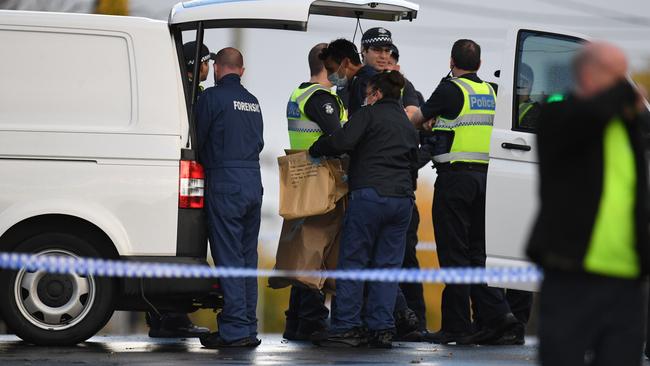
“There’s a bomb,” she says.
“Help me – quickly, please,” she says, before the call is cut off.
Khayre and the hostage called triple-0 again a short time later.
He seemed upset the police hadn’t stormed the room, the escort later said in a statement read to the court.
In the second audio call she can be heard saying “please” before Khayre cuts her off.
He calmly states the address to her, which she repeats into the phone.
She seems to say, “I called before, why didn’t you come?” as the operator confirms the address.
“I cannot move, he wants to kill me,” she says.
The operator says, “I’m having a bit of trouble understanding you”.
Khayre can be heard telling her to say she is a hostage.
“Hostage,” he says. “Hostage.”
He tells them again the woman is a hostage at a Brighton hotel.
“If police storm the hotel … the hostage is going to die,” he says.
“There’s a hostage in the situation, and there’s a bomb — that’s all we’re going to say.”
The second call ends as police set up a cordon outside and plan their strategy.
About 6pm, there is an exchange of gunfire outside the apartments that was captured by police helicopter footage.
Khayre is seen rushing at police firing a sawn-off shotgun he had purchased with the proceeds of burglaries committed in the months before the attack.
The terrifying siege ends as he is shot by police, dying at the scene.
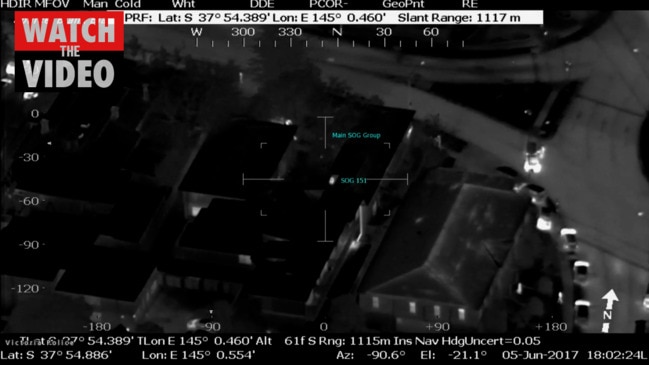
GUNMAN’S DISTURBING INTERNET SEARCHES BEFORE SIEGE
Khayre was on parole at the time of the terrifying events of June 5, 2017.
He served four years and two months in jail for the offences of recklessly causing injury, intentionally causing injury, aggravated burglary and theft.
He was also in 2010 acquitted of a terrorism-related offence, charged and found not guilty of financing East African extremist organisation Al-Shabab and planning an attack on the Holsworthy army barracks in NSW.
The coroner was told this week that Khayre sought out disturbing material online in increasing volumes in the week leading up to the siege.
He looked up ISIS, martyrdom on the battlefield, the 2014 Lindt cafe siege in Sydney, terror attacks in Paris and London, and police tactics when responding to an act of terror.
But the lawyer assisting the court Rachel Ellyard told the coroner on Friday it could not be stated for certain he was motivated by Islamic extremism.
He “cloaked himself in the mantle of ideology” and did ultimately shoot at police but also seemed driven by psychological problems, she said.
“Why did he do it?” she said.
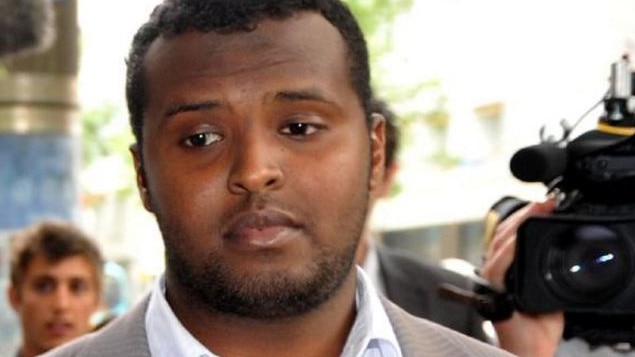
“It’s noteworthy that he is described by the hostage in her statement as saying that he wanted the police to come and kill him, not that he wanted to kill the police.
“In the absence of psychological material about him, it is not possible to reach a firm conclusion about his motivations.”
When he was released from jail he appeared to show a “low risk of radicalisation”, but began “radicalising himself” through the internet.
“One can see a potential gap in that Yacqub hadn’t been psychologically assessed and he wasn’t receiving psychological treatment,” she said.
“We can’t know what that treatment would have revealed, what diagnosis he might have received, and what difference that might have made.”
She told the coroner on Friday the horrifying events were not due to “deficiencies or lack of attention” by authorities.
There wasn’t evidence for “any proper basis for criticism of any of the interested parties here on how they did their work”, including Victoria Police, the prison system, the Adult Parole Board, and community support programs, she said.
She said the shocking events showed “the limitations on what parole can do”.
“The decision to grant Yacqub parole was open and appropriate, given the need to reintegrate him into the community in a structured way,” she said.
“Many in the community will feel that it ought to have been possible to prevent the death of Mr Hao and indeed of Yacqub.
“This case shows the difficulty in identifying and responding to signs that someone may be becoming radicalised or planning to take extremist actions.”
The coroner’s findings will be handed down at a later date.
Originally published as Hostage dialled triple-0 during Yacqub Khayre’s ISIS-motivated siege at Brighton, inquest reveals



